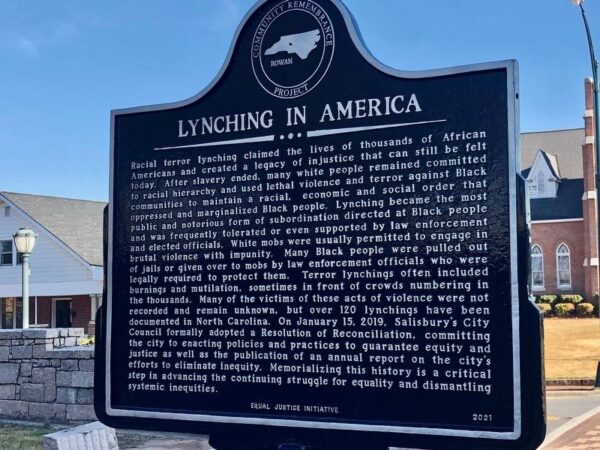Born 1871, Laura Wood, an African American woman, was 59 when she was lynched in Rowan County, NC, on February 11, 1930. Rowan County is roughly 37 miles from where I live today.
Laura Wood was a farmer, wife, and mother of four adult children. Her husband, Neal Wood, said, “…She left home to help with laundering at a nearby house but did not show up.” She was found hanging from a tree by a plow chair. She was hanged after being rendered unconscious. She was accused of stealing two hams and quarreling with a white woman. Laura Wood would have been the age of my great grandmother.
The brutal practice of racial terror lynching claimed the lives of countless African Americans, leaving behind a legacy of fear and injustice that echoes into the present. After slavery was abolished, many white individuals clung to racial dominance, using violence and terror to suppress Black communities and preserve systems of oppression. Lynching became a widespread and horrifying tool of control, often with the complicity—or even active support—of law enforcement and public officials.
White mobs frequently committed acts of extreme violence without consequence. In many instances, law enforcement failed to protect Black individuals, handing them over to mobs or allowing them to be taken from jails. These lynchings often involved heinous acts like burning and mutilation, carried out in front of large crowds.
Although many victims remain unnamed and unrecorded, roughly 120 racial terror lynchings have been documented in North Carolina between 1877 and 1950. It is uncertain how many of these lynchings were women. But we do know this: Nation-wide racial terror lynchings were not merely acts of retaliation or attempts at so-called “popular justice” for alleged crimes. Instead, they served a larger purpose: to assert dominance and spread fear throughout the African American community. While newspapers initially suggested that criminal charges would result from the investigation into Laura Wood’s lynching, historical records show no evidence that anyone was ever arrested for her murder.
This history is not a secret, but is easily forgotten, rationalized, or minimized. Yet its karmic seeds continue to sprout in our collective consciousness.
The lynching of Laura Wood in 1930 is not just a tragedy of the past; it holds profound relevance for us today. For example, I’m still haunted by Sandra Bland, a 28-year old African American woman who on July 10, 2015, was pulled over then arrested in Texas by a white State Trooper, 30-year old Brian Encinia, for her failure to signal a lane change. Her arrest photos showed significant facial bruising, and on July 13, three days later, she was found hanged in a Waller County jail cell. Today, we see unchecked abuse of power in our political climate where figures like Donald Trump and many of his appointees have actively undermined justice and accountability. Policies and rhetoric that marginalize communities of color, suppress voices, and embolden white supremacist ideologies and violence serve as modern manifestations of the racial dominance and impunity that allowed Laura Wood’s and too many others’ lynchings to occur.
This lack of accountability in leadership perpetuates systems of greed, hatred, and confusion, making it all the more important to confront our nation’s history of racial terror. By remembering individuals like Laura Wood and recognizing the failures of justice—both then and now—we can better understand the urgency to transform oppressive systems and foster a society rooted in equity, compassion, and accountability. What role can you play in contributing to racial justice and harmony?
Racism is a heart disease, and it’s curable.
Learn more: Mindful of Race Online Academy.
NOTE: In 2021, a memorial marker for Ms. Wood and 5 others lynched in Rowan County, NC between 1902 and 1930, was erected by Actions in Faith & Justice and the Equal Justice Initiative.

